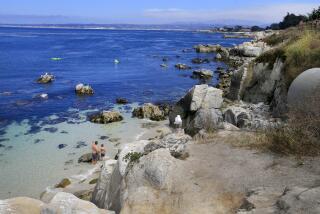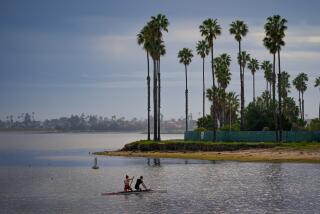Florida Bay proposals would restrict boaters
- Share via
FORT LAUDERDALE, FLA. — Concerned that powerboats are tearing up seagrass in Florida Bay, Everglades National Park has proposed a range of possible restrictions on boaters to protect a vast, shallow estuary that supports sea turtles, fish and wading birds.
The proposals have generated deep concern among South Florida’s recreational fishing community, where many people worry that the most drastic alternatives could shut them out of most of the bay and hurt the tourism industry.
But park officials say boats have carved at least 325 miles of scars into the bay, with the damage accelerating in an era of bigger boats, more powerful engines and tough stainless-steel propellers that enable boaters to penetrate shallow, difficult-to-navigate areas.
“People . . . just feel they can power over whatever they come across,” said David King, the park’s Florida Bay District ranger. “Florida Bay has the potential to be one of the phenomenal natural areas of the world. It’s not that today. It’s been beat up.”
In the forest-green carpet of seagrass along the bay bottom, light-green streaks indicate areas where propellers have stripped bare the vegetation. Seagrass provides food for fish, manatees and sea turtles and serves as a nursery and hunting grounds for marine creatures.
All the park’s proposals include mandatory permits and boater education, but they vary in how much they would restrict powerboats. The most severe would create huge zones in which boaters could use only push-poles or low-speed electric motors.
The park expects to announce its recommendation this fall and implement the plan in 2011.
Despite its vast expanse, Florida Bay is extremely shallow, with an average depth of 3 feet -- treacherous for boaters. It’s not unusual to see a heron or egret standing in water hundreds of yards from land.
Capt. Tad Burke, head of the Florida Keys Fishing Guides Assn., said the guides had drawn up an alternative that would emphasize a thorough and mandatory education program before boaters could enter Florida Bay, which he called “one of the most difficult bodies of water to navigate.”
The guides strongly oppose creating huge pole-and-troll zones, which he said would in effect close off much of the bay.
“We want to protect the environment,” he said. “But we also want to protect the economic value of Everglades National Park. How can you close off massive areas of the park?”
Environmental groups generally support the tougher restrictions, arguing that the park’s first duty is to protect natural resources.
“No one likes more regulations, but the boating traffic has gone up 2 1/2 times in the last 30 years,” said Brian Scherf of the Florida Biodiversity Project.
“These seagrass areas are so important for juvenile fish habitat, food supply, hunting grounds for other fish. If you don’t have healthy seagrass, you won’t have great fishing,” he said.
Ted Perron, organizer of the Palm Beach Water Yaks kayaking club, supports the strictest limits on boats but said he doesn’t want them evicted.
“It’s not to exclude the boaters,” he said. “It’s to protect the Everglades.”
--
More to Read
Sign up for Essential California
The most important California stories and recommendations in your inbox every morning.
You may occasionally receive promotional content from the Los Angeles Times.










